In today’s competitive online landscape, having a beautiful travel website isn’t enough. Without proper SEO for travel websites, even the most stunning virtual storefronts remain hidden from potential customers. With over 70% of travel research and booking happening online, effective search engine optimization has become the difference between thriving travel businesses and those struggling to stay afloat.
This comprehensive guide will walk you through proven strategies to increase your travel website’s visibility, drive qualified traffic, and convert visitors into paying customers. Whether you’re a tour operator, travel agency, or destination blogger, these actionable techniques will help you navigate the unique challenges of travel industry SEO.
Why SEO is Critical for Travel Websites
The travel industry faces unique SEO challenges that make strategic optimization essential for success:
- Extreme Competition: You’re not just competing with other travel agencies or tour operators. Online travel aggregators, booking platforms, destination marketing organizations, travel bloggers, and even Google’s own travel products are all vying for the same search visibility.
- Seasonal Fluctuations: Travel search behavior changes dramatically throughout the year, requiring adaptive SEO strategies that anticipate and respond to these shifts in demand.
- Complex User Intent: Travel searchers may be in various stages of the planning journey—from dreaming and researching to comparing prices and booking. Your SEO strategy must address multiple intents simultaneously.
- High-Value Transactions: With the average leisure trip costing thousands of dollars, the stakes for capturing organic search traffic are exceptionally high.
According to industry data, travel websites with strong SEO strategies see 5-7x more bookings than those without optimized online presence. This isn’t surprising when you consider that 76% of travelers begin their travel planning with a search engine.
Strategic Keyword Research for Travel Niches
Effective SEO for travel websites begins with identifying the right keywords that align with both search volume and user intent. Unlike other industries, travel keyword research requires understanding the traveler’s journey from inspiration to booking.
Understanding Travel Keyword Categories
Travel keywords generally fall into distinct categories, each representing different stages of the traveler’s decision process:
- Inspirational Keywords: “Best destinations for families,” “unique honeymoon ideas”
- Informational Keywords: “Things to do in Bali,” “best time to visit Morocco”
- Transactional Keywords: “Affordable Europe tours,” “luxury hotels in Santorini”
- Navigational Keywords: Specific brand names or services
- Local Intent Keywords: “Tours near me,” “New York City walking tours”
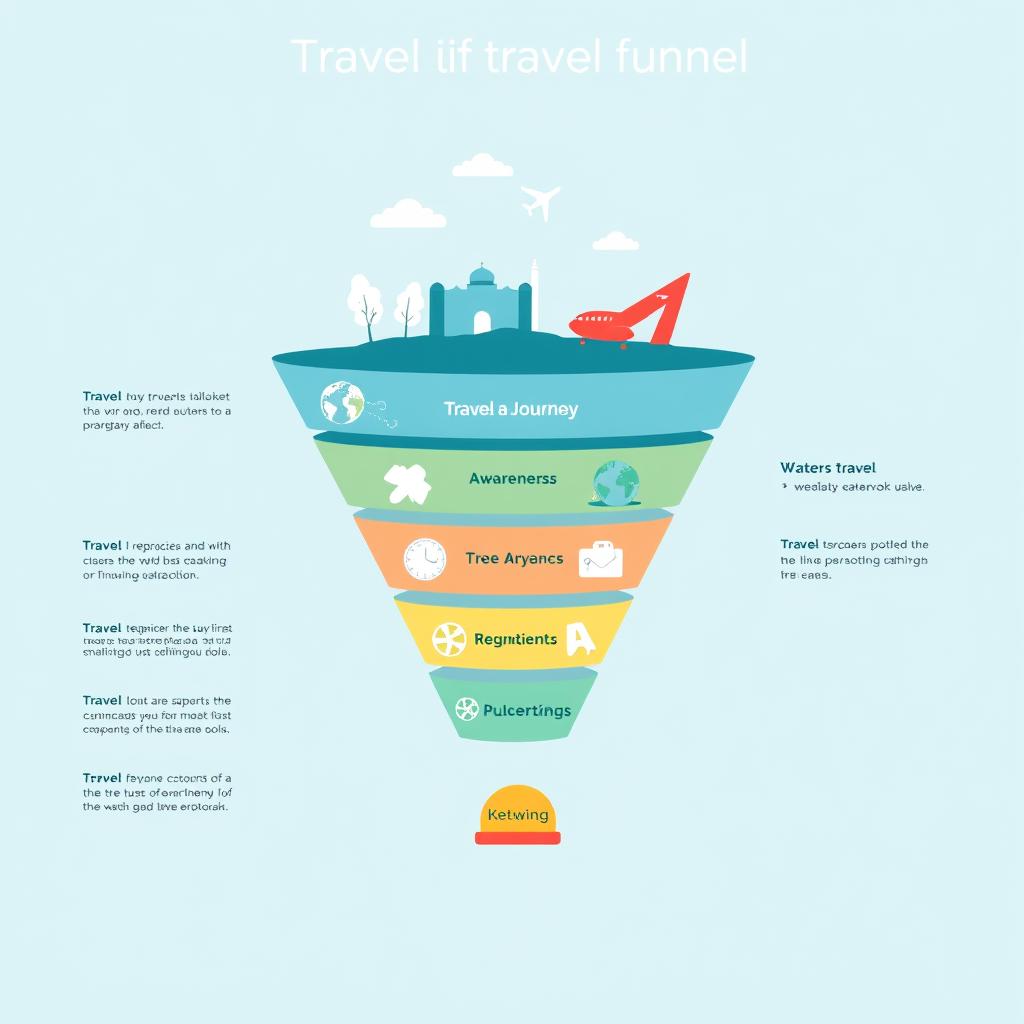
Finding the Right Travel Keywords
To identify high-potential keywords for your travel website:
- Start with seed keywords related to your specific travel niche (tours, accommodations, destinations)
- Use keyword research tools like Google Keyword Planner, Semrush, or Ahrefs to expand your list
- Analyze search volume and competition to find the sweet spot of keywords with decent search volume but manageable competition
- Focus on long-tail keywords that indicate high intent, such as “family-friendly hotels in Dubai with kids club” rather than just “Dubai hotels”
- Research seasonal variations in search terms to plan content calendars accordingly
| Keyword Type | Example | Search Intent | Content Strategy |
| Destination-focused | “Best hotels in Bali” | Research/Comparison | Curated lists with detailed reviews |
| Experience-focused | “Adventure tours in Costa Rica” | Activity-specific | Tour packages with vivid descriptions |
| Question-based | “How to plan a trip to Japan” | Informational | Step-by-step guides |
| Seasonal | “Christmas markets in Europe” | Time-sensitive planning | Seasonal guides updated annually |
| Budget-focused | “Affordable family vacations” | Value-seeking | Budget guides with package options |
Ready to discover your best keywords?
Start finding the perfect keywords for your travel business with our recommended tool. Uncover high-potential opportunities your competitors are missing.
Try Free Keyword Research Tool
On-Page SEO Essentials for Travel Websites
On-page optimization is where you implement your keyword strategy across your travel website’s content and HTML elements. For travel websites, this requires special attention to visual elements and location-specific details.
Meta Tags Optimization
Properly optimized meta tags help search engines understand your content and can significantly improve click-through rates from search results:
- Title Tags: Include your primary keyword and location, keep under 60 characters, and add compelling language (e.g., “10 Stunning Bali Villas with Private Pools | Exclusive Deals”)
- Meta Descriptions: Write compelling 150-160 character summaries that include your keyword and a clear call-to-action
- Header Tags (H1-H6): Structure content with keyword-rich headers that help both users and search engines navigate your content
Example of Optimized Meta Tags for Travel Pages
Title Tag:
<title>Luxury Safari Tours in Tanzania | 2025 Expert Guides</title>
Meta Description:
<meta name=”description” content=”Experience unforgettable luxury safari tours in Tanzania with our expert guides. See the Big Five, witness the Great Migration, and stay at premium lodges. Book now!”>
Image Optimization for Travel Websites
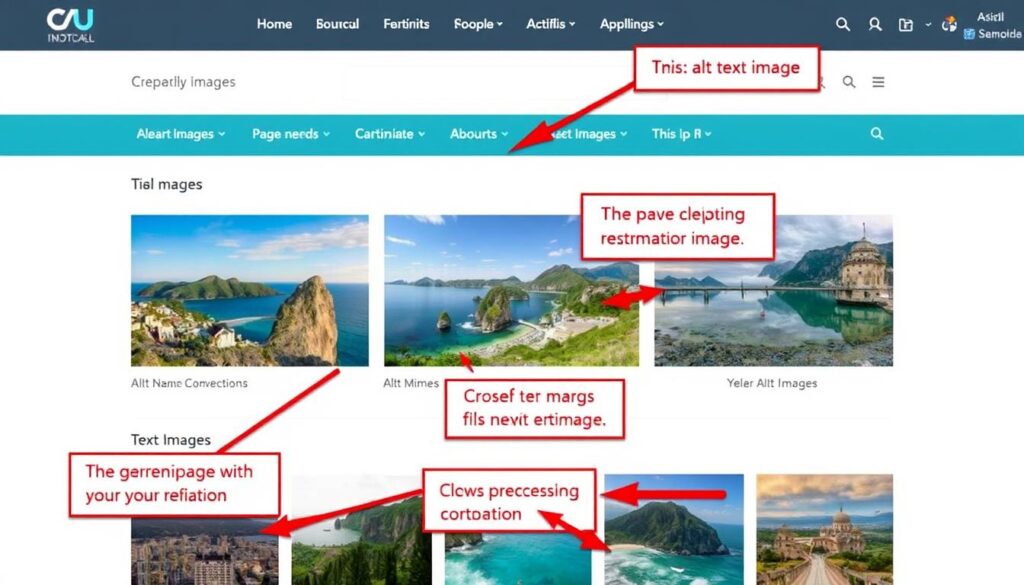
Visual content is crucial for travel websites, but improperly optimized images can slow down your site and miss SEO opportunities:
- Descriptive File Names: Rename image files from generic “IMG_1234.jpg” to descriptive “luxury-beachfront-villa-bali.jpg”
- Alt Text: Add detailed, keyword-rich alternative text that describes the image for both accessibility and SEO (e.g., “Luxury beachfront villa in Seminyak, Bali with private infinity pool”)
- Image Compression: Optimize file sizes without sacrificing quality using tools like TinyPNG or Squoosh
- Responsive Images: Implement responsive image code to ensure proper display across all devices
- Image Sitemaps: Create image sitemaps to help search engines discover and index your visual content
URL Structure and Internal Linking
A logical URL structure and strategic internal linking help both users and search engines navigate your travel website:
URL Best Practices:
- Use descriptive, keyword-rich URLs
- Keep URLs short and readable
- Include location information when relevant
- Use hyphens to separate words
- Implement a logical hierarchy
Example URL Structure:
Poor URL:
example.com/p=123?id=456
Good URL:
example.com/tours/italy/tuscany-wine-tour
Internal linking connects your content and helps distribute page authority throughout your site. For travel websites, consider these linking strategies:
- Link from destination guides to relevant tour packages
- Connect related destinations (e.g., link Thailand content to other Southeast Asia pages)
- Create hub pages that link to detailed content on specific topics
- Use descriptive anchor text that includes keywords when appropriate
- Ensure every page is accessible within 3-4 clicks from your homepage
Technical SEO for Travel Websites
Technical SEO ensures search engines can effectively crawl, index, and render your travel website. Given the complex nature of travel sites with numerous pages, booking systems, and media-rich content, technical optimization is particularly important.
Site Speed Optimization
Site speed is a critical ranking factor and directly impacts user experience and conversion rates. Travel websites are often image-heavy, making speed optimization essential:
- Compress images without sacrificing quality
- Implement browser caching to store commonly used resources
- Minify CSS, JavaScript, and HTML to reduce file sizes
- Use a Content Delivery Network (CDN) to serve assets from servers closer to users
- Optimize server response time through quality hosting
- Reduce redirect chains that add additional loading time
According to Google, 53% of mobile users abandon sites that take longer than 3 seconds to load. For travel websites, where users often compare multiple options, a fast-loading site can be a competitive advantage.
Mobile Optimization
With over 60% of travel searches occurring on mobile devices, mobile optimization is non-negotiable for travel websites:
- Implement responsive design that adapts to all screen sizes
- Ensure tap targets (buttons, links) are appropriately sized for mobile users
- Optimize forms for mobile completion
- Test user experience across multiple devices and browsers
- Consider mobile-first indexing in your design approach
Schema Markup for Travel Websites
Schema markup helps search engines understand your content and can enable rich results in search listings. For travel websites, these structured data types are particularly valuable:
- TouristAttraction – For landmarks, points of interest
- TouristDestination – For cities, regions, countries
- Hotel – For accommodation listings
- Event – For tours, excursions, seasonal activities
- LocalBusiness – For physical agency locations
- FAQ – For frequently asked questions
- Review – For customer testimonials
- Offer – For special deals and packages
Example Schema Markup for Tour Package
<script type="application/ld+json">
{
"@context": "https://schema.org",
"@type": "TouristTrip",
"name": "7-Day Bali Adventure Tour",
"description": "Experience the best of Bali...",
"touristType": ["Adventure seekers", "Couples"],
"offers": {
"@type": "Offer",
"price": "1299",
"priceCurrency": "USD"
}
}
</script>
Implementing proper schema markup can result in enhanced search listings with pricing, availability, ratings, and other information that increases click-through rates.
Content Strategies for Travel Websites
Content is the cornerstone of SEO for travel websites. High-quality, engaging content not only helps with rankings but also inspires travelers and builds trust in your brand.
Creating Destination Guides
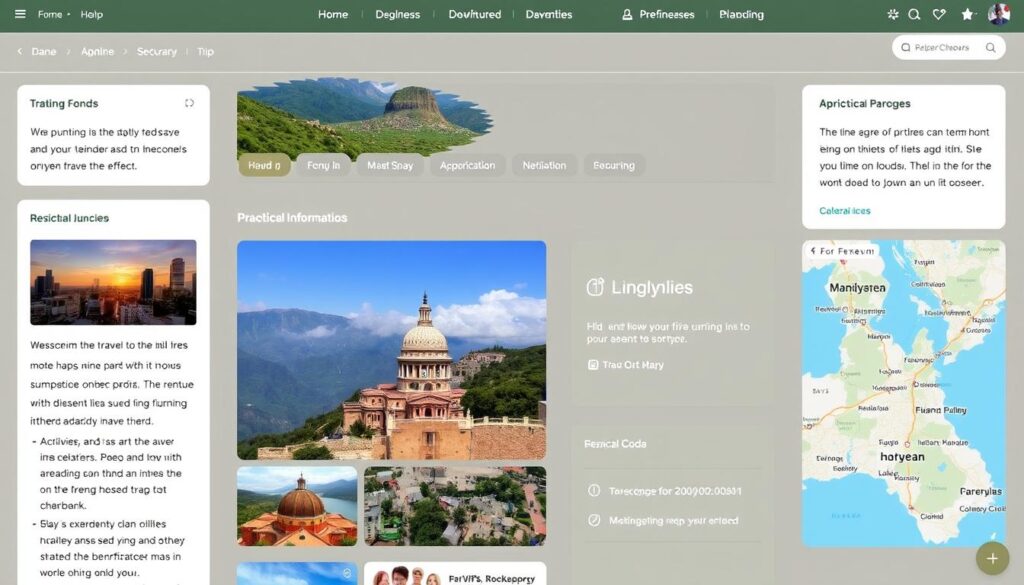
Comprehensive destination guides are powerful assets for travel websites, serving multiple purposes in your SEO strategy:
- Target multiple keywords related to a destination
- Provide genuine value to travelers in the research phase
- Establish authority in specific destinations
- Create opportunities for internal linking to tour packages
- Attract backlinks from other travel sites and resources
When creating destination guides, include these essential elements:
Must-Have Elements:
- Overview and highlights
- Best time to visit
- How to get there
- Accommodation options
- Top attractions and activities
- Local cuisine recommendations
- Practical tips (currency, language, customs)
- Sample itineraries
SEO Enhancements:
- Interactive maps
- High-quality original photos
- Video content
- User-generated content
- Expert quotes or interviews
- Updated information (dates, prices)
- FAQ sections targeting related queries
Leveraging Video Content
Video content is increasingly important for travel websites, with 65% of travelers watching videos when researching destinations:
- Create destination overview videos showcasing highlights
- Develop virtual tours of accommodations or attractions
- Share authentic experiences through customer testimonials
- Produce how-to content like packing tips or travel hacks
- Optimize video titles, descriptions, and tags with relevant keywords
- Add transcripts to videos for additional SEO value
- Embed videos on relevant pages to increase engagement
Seasonal and Trending Content
The travel industry is highly seasonal, with search trends fluctuating throughout the year. Capitalize on these patterns with strategic content planning:
- Create and promote seasonal content 2-3 months before peak interest (e.g., publish summer destination guides in spring)
- Update existing seasonal content annually with fresh information
- Develop content around upcoming events (festivals, sporting events, conferences)
- Monitor Google Trends for emerging travel interests
- Repurpose content for different seasons (e.g., “Paris in Summer” vs. “Paris in Winter”)
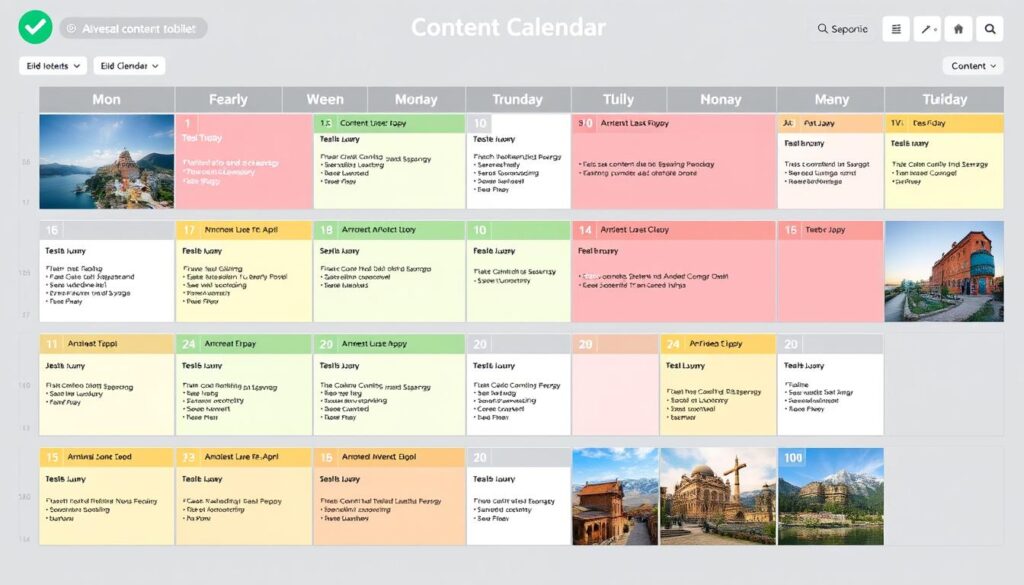
Local SEO for Travel Agencies
For physical travel agencies or tour operators with local offices, local SEO is essential to attract nearby customers and establish regional authority.
Google Business Profile Optimization
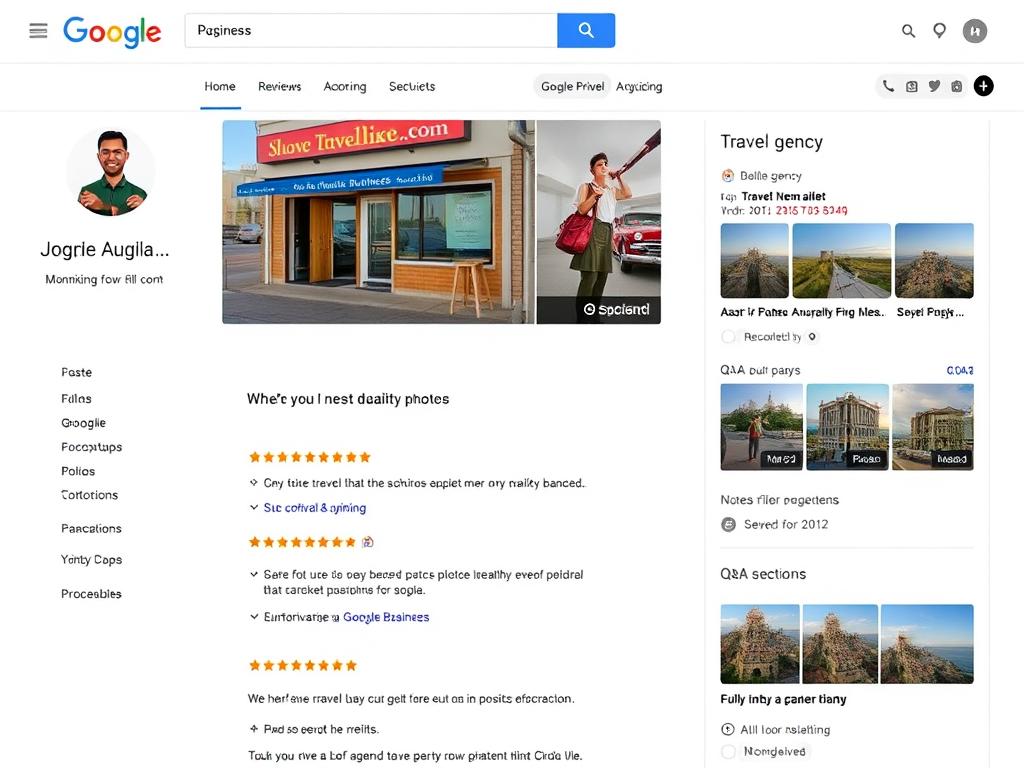
Your Google Business Profile (formerly Google My Business) is the cornerstone of local SEO for travel businesses:
- Claim and verify your business listing
- Complete all information fields (name, address, phone, website, hours)
- Select appropriate categories (Travel Agency, Tour Operator, etc.)
- Add high-quality photos of your office, team, and destinations
- Collect and respond to reviews promptly and professionally
- Post regular updates about special offers, events, or new destinations
- Answer questions in the Q&A section
Location-Based Content
Create content that targets travelers in your local area or those interested in traveling from your location:
- Develop location-specific landing pages (e.g., “European Tours from Chicago”)
- Create neighborhood guides for your local area
- Publish content about direct flights from your local airport
- Highlight local travel agents and their expertise
- Share stories of local travelers who have used your services
Local Link Building
Build local authority through strategic partnerships and community involvement:
- Join local chambers of commerce and tourism associations
- Partner with complementary local businesses (hotels, restaurants)
- Sponsor local events relevant to travel or tourism
- Contribute to local publications with travel expertise
- Create location-specific resources that attract links from local sites
Link Building Strategies for Travel Websites
Quality backlinks remain one of the most powerful ranking factors. For travel websites, strategic link building can significantly improve domain authority and search visibility.
Travel Industry Partnerships
Forge strategic partnerships within the travel ecosystem to earn valuable backlinks:
- Collaborate with hotels and accommodations you recommend
- Partner with complementary services (airport transfers, travel insurance)
- Develop relationships with tourism boards for official recognition
- Create co-branded content with travel-adjacent businesses
- Join industry associations with member directories
Travel Influencer Collaborations
Working with travel influencers can generate high-quality backlinks, social signals, and authentic content:
- Offer complimentary or discounted experiences in exchange for content
- Host influencer trips to generate multiple pieces of content
- Collaborate on destination guides with influencer insights
- Create affiliate partnerships with travel bloggers
- Develop ambassador programs for long-term relationships
Content-Driven Link Building
Create linkable assets that naturally attract backlinks from travel publications and resources:
- Publish original research or surveys about travel trends
- Create comprehensive resources like ultimate guides or ebooks
- Develop interactive tools (packing calculators, budget planners)
- Design shareable infographics with travel statistics or tips
- Compile unique data like “Best Time to Book” analyses
“The best link building strategy for travel websites is to create genuinely useful resources that solve problems for travelers. When you help people plan better trips, the links follow naturally.”
— Travel SEO Expert
Overcoming Common Travel SEO Challenges
Travel websites face unique SEO challenges that require specific strategies to overcome. Here are five actionable solutions to common obstacles:
1. Managing Seasonal Demand Fluctuations
Challenge: Travel search volume fluctuates dramatically throughout the year, making it difficult to maintain consistent traffic.
Solution:
- Develop a year-round content calendar that anticipates seasonal trends
- Create evergreen content that performs well regardless of season
- Target “shoulder season” keywords to capture traffic during off-peak times
- Diversify destination coverage to include locations with different high seasons
- Use historical data to predict and prepare for seasonal shifts
2. Competing with OTAs and Travel Giants
Challenge: Online Travel Agencies (OTAs) like Booking.com and Expedia dominate search results for many travel terms.
Solution:
- Focus on niche specialization rather than competing for broad terms
- Highlight unique experiences and expertise that OTAs can’t offer
- Create content that showcases local knowledge and insider tips
- Target long-tail keywords with less competition
- Build authority in specific destinations or travel types
3. Addressing Duplicate Content Issues
Challenge: Travel websites often have similar descriptions for tours, destinations, or properties, creating duplicate content concerns.
Solution:
- Write unique descriptions for each tour, property, or destination
- Implement proper canonical tags for necessary duplicate pages
- Create unique value-adds like insider tips or personal recommendations
- Use structured data to differentiate similar content
- Focus on unique aspects of each offering rather than standard features
4. Maintaining Updated Content
Challenge: Travel information changes frequently (prices, schedules, availability), making content maintenance challenging.
Solution:
- Implement a regular content audit schedule to identify outdated information
- Use dynamic content where possible for automatically updated information
- Add “Last Updated” dates to content to signal freshness to users and search engines
- Prioritize updating high-traffic pages first
- Create systems for tracking destination changes (new attractions, closed venues)
5. Optimizing for Multiple Languages and Regions
Challenge: International travel businesses need to target travelers from different countries and language backgrounds.
Solution:
- Implement proper hreflang tags for language/region targeting
- Create dedicated content for different target markets
- Consider cultural differences in travel preferences and search behavior
- Use international SEO best practices for URL structure
- Optimize for local search engines beyond Google (Baidu, Yandex, etc.)
Measuring Travel SEO Success
Effective measurement is essential to refine your travel website’s SEO strategy and demonstrate ROI. Focus on these key metrics and tools:
Key Performance Indicators
- Organic Traffic: Overall visitors from search engines
- Conversion Rate: Percentage of visitors who complete desired actions
- Booking Value: Revenue generated from organic traffic
- Keyword Rankings: Positions for target keywords
- Click-Through Rate (CTR): Percentage of impressions resulting in clicks
- Bounce Rate: Percentage of single-page sessions
- Page Load Time: Speed metrics across devices
- Backlink Quality and Quantity: Link profile growth
Essential Measurement Tools
- Google Analytics: Track traffic, user behavior, and conversions
- Google Search Console: Monitor indexing, CTR, and technical issues
- SEO Platforms: Semrush, Ahrefs, or Moz for comprehensive analysis
- Rank Tracking Tools: Monitor keyword positions over time
- Heat Mapping Tools: Understand user engagement on pages
- Page Speed Tools: GTmetrix or PageSpeed Insights
- Backlink Analysis Tools: Monitor link profile health
Set up custom dashboards that focus on travel-specific metrics, such as:
- Booking engine entries from organic search
- Destination guide engagement metrics
- Seasonal traffic patterns compared year-over-year
- Conversion rates by traffic source and device
- Revenue attribution to specific content pieces
Regularly review these metrics to identify opportunities for optimization and to demonstrate the value of your SEO investments.
Conclusion: Your Roadmap to Travel SEO Success
Implementing effective SEO for travel websites requires a strategic approach that addresses the unique challenges and opportunities in this competitive industry. By focusing on comprehensive keyword research, creating compelling content, optimizing technical elements, building quality backlinks, and measuring results, you can significantly improve your travel website’s visibility and booking conversions.
Remember that SEO is a long-term investment. While some tactics may yield quick wins, sustainable success comes from consistent effort and adaptation to changing search trends and algorithms. Start by auditing your current SEO performance, identifying the most impactful opportunities, and developing a prioritized implementation plan.
Ready to transform your travel website’s performance?
Take the first step toward better visibility and more bookings. Our team of travel SEO specialists can help you implement these strategies and develop a customized plan for your specific business needs.
Whether you’re a tour operator, travel agency, or destination marketer, the strategies outlined in this guide will help you navigate the complex world of travel SEO and stand out in an increasingly digital marketplace. Start implementing these techniques today, and watch your organic traffic—and bookings—soar.
Frequently Asked Questions About Travel Website SEO
How long does it take to see results from SEO for a travel website?
SEO for travel websites typically shows initial improvements within 3-6 months, with more significant results appearing after 6-12 months of consistent implementation. The timeline depends on your website’s current authority, competition level, and the aggressiveness of your strategy. Focus on creating quality content and building authority in your travel niche for sustainable long-term results.
Should I focus more on local SEO or global SEO for my travel business?
This depends on your business model. If you have physical locations serving local customers (like a travel agency with offices), then local SEO should be a priority alongside your broader strategy. If you operate exclusively online and serve customers globally, focus on destination-specific and niche travel content. Many successful travel businesses implement both approaches, using local SEO to capture nearby customers while building global authority in specific travel niches.
How can I compete with major OTAs like Booking.com and Expedia?
Rather than competing directly for high-volume generic terms, focus on differentiation through specialization. Target long-tail keywords specific to your niche, create in-depth content that showcases your expertise, highlight unique experiences that OTAs don’t offer, and emphasize personal service. Build authority in specific destinations or travel types where you have genuine expertise. Many travelers prefer booking with specialists who offer insider knowledge and personalized recommendations that large OTAs can’t provide.
How important is mobile optimization for travel websites?
Mobile optimization is absolutely critical for travel websites. Over 60% of travel searches and 40% of bookings now occur on mobile devices. Google’s mobile-first indexing means your site’s mobile version determines your rankings. Ensure your travel website is fully responsive, loads quickly on mobile networks, has easy-to-use navigation and booking forms, and provides a seamless experience across all devices. Pay special attention to the mobile booking experience, as complex forms can lead to abandoned transactions.
What types of content perform best for travel website SEO?
The most effective content types for travel websites include comprehensive destination guides, authentic experience stories, practical planning resources (itineraries, packing lists), insider tips and secrets, seasonal guides, and visual content (high-quality photos and videos). Content that solves specific travel problems or answers common questions tends to perform particularly well. Focus on creating content that serves different stages of the travel planning journey, from inspiration and research to practical booking information.
